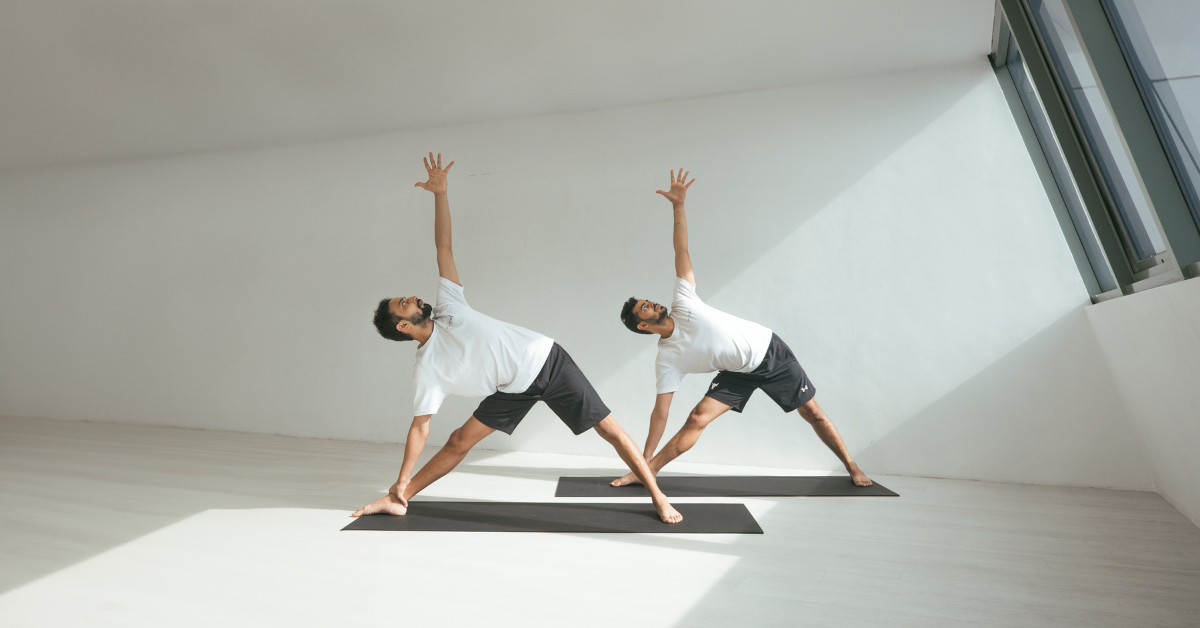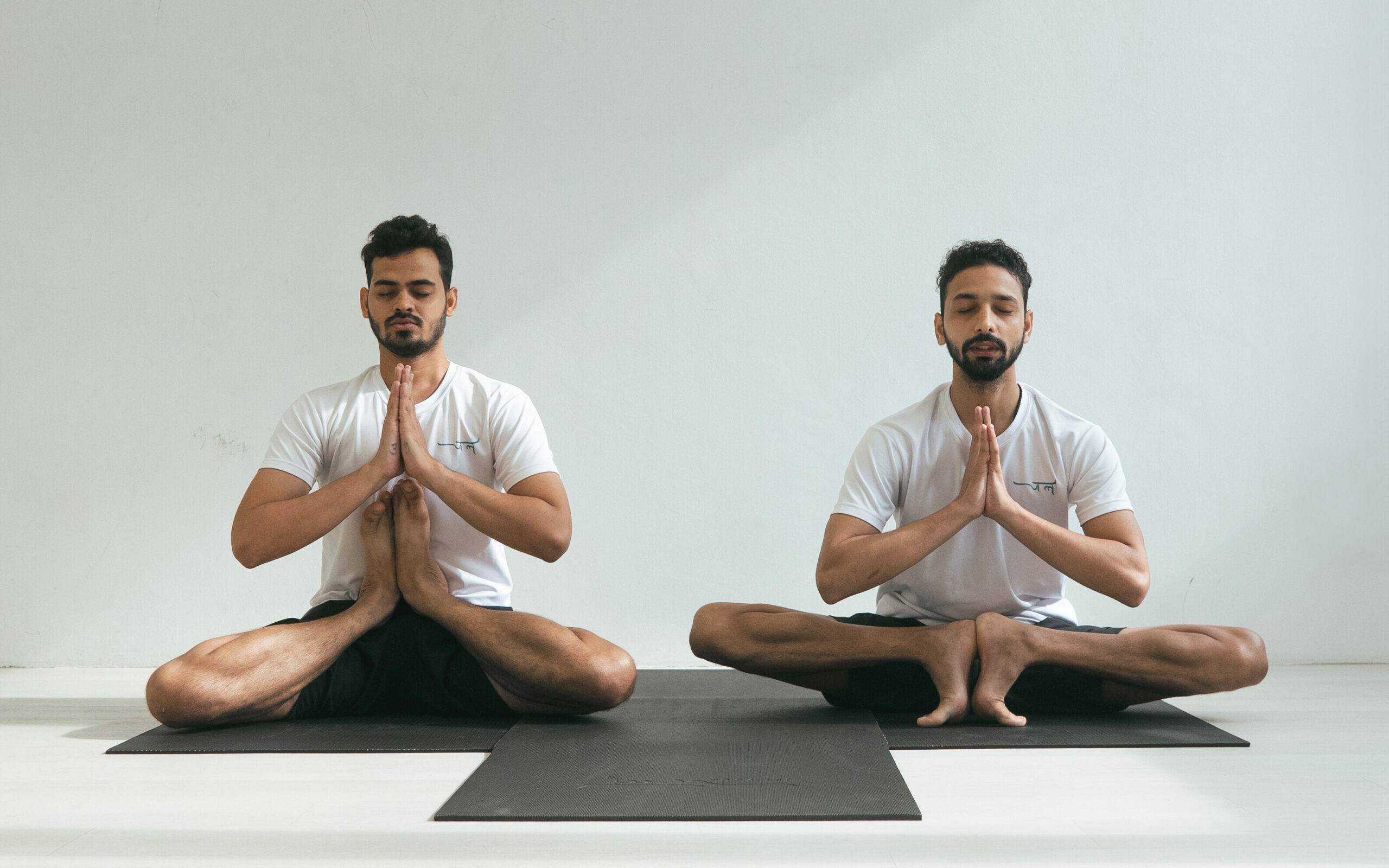#Insider Spotlight
Sunny & Abhijeet from Jal Yoga Reveal Expert Tips for Mastering Mind Control
Take it slow and connect yourself through yoga
By: Iffah Salleh / February 9, 2024

2024 marks the year of manifestation – a time when our actions truly come to fruition. The essence of manifestation lies in our ability to channel our intentions into reality, and this year, that’s our guiding principle.
In a world constantly evolving around us, it’s easy to feel overwhelmed. But amidst this chaos, we have the power to slow down and to centre ourselves. This year, let’s prioritise mind control and mental well-being. Understanding and nurturing our mental health is paramount.
Yoga emerges as a powerful tool for achieving this balance. Through yoga, we find tranquillity, a space to clear our minds and restore inner peace. It’s a journey toward holistic wellness, empowering us to face life’s challenges with resilience and grace.

To delve deeper into this transformative practice, Beauty Insider had the privilege of conversing with experts Sunny and Abhijeet from Jal Yoga. Their expertise in yoga therapy offers invaluable insights into mastering mind control. Together, let’s embark on a journey of self-discovery and compassion, embracing a kinder, healthier mindset for our minds and souls.
Contents
Keeping Our Minds in Check
Sunny and Abhijeet, tell us the story! How did you find yourself diving into yoga therapy, especially when it comes to keeping our minds in check?
Sunny: In a Brahmin family, I started practising yoga at 14 years old. As Sage Patanjali wisely shared, the ultimate purification of the mind is through yoga.
When I first started yoga and meditation, my mind would constantly wander. But over time, the practice taught me to focus on the present and it gives my mind a mental break. Beyond that yoga therapy also stands as a complementary or alternative approach to treating disorders, fostering a profound sense of well-being and a sunnier perspective on life.
Abhijeet: I used to practise yoga back in India and I witnessed the positive impact on my mental and physical health. Inspired to support others on their mental wellness journey, I pursued a Master’s in yoga therapy and specialised in therapeutic techniques. Now, as a yoga therapist, I guide individuals on a journey to balance the mind and body through tailored yoga practices and mindfulness.
Therapy and Yoga
Jal Yoga’s got this fantastic blend of traditional therapy and yoga. What’s the secret sauce, and how does it make a regular yoga session a game-changer for mental well-being?
Sunny: A dedicated focus on the mind-body connection. In the realm of yoga therapy, participants dive into the art of being present, cultivating self-awareness, and mastering the art of handling overwhelming thoughts. This heightened awareness extends to emotional regulation, paving the way for healthy responses to a spectrum of emotions.
What makes it remarkably impactful is the trifecta of physical movement, breathwork, and meditation. This trio doesn’t just get you moving; it positively influences neurotransmitters tied to mood. Tagged to this positive influence are better sleep patterns which is a welcome relief for those wrestling with mental health challenges.
Abhijeet: In a nutshell, yoga therapy isn’t merely a set of exercises; it’s a holistic mental well-being approach. It treats individuals as a whole, acknowledging the interconnected dance of physical, mental, and emotional health. While it doesn’t replace professional mental health care, it stands as a potent complement, equipping individuals with mindfulness tools, coping strategies, and a supportive community on their transformative journey to mental well-being.
Therapy mixed with yoga – that’s pretty cool! How do you tailor sessions to fit each person’s vibe and make sure they’re leaving with that zen feeling?
Sunny: I vividly recall a day when a lady walked in Jal Yoga, visibly burdened by severe back pain. Her discomfort was written all over her face, whether she was seated or standing. It was then that my teacher’s wisdom echoed in my mind — yoga, the antidote to life’s dualities. The challenge was clear: how to help her overcome this pain?
As my teacher emphasised, the mind is both a friend and an enemy to itself. Understanding the root cause of the problem is the first step to conquering it. In our yoga therapy sessions, we guide individuals to explore the depths of their issues, focusing particularly on the “Vijayanmaya Kosha,” unravelling the layers of their being.
Our approach is educational, empowering individuals with the knowledge of how yoga can be a transformative force in their lives. Each session is a bespoke experience, crafted to align with their specific needs and health goals. This personalised touch is the key to helping our practitioners achieve that blissful state, what we fondly refer to as the “Zen” state. It’s not just about alleviating pain; it’s about guiding them on a journey toward holistic well-being.
Spiritual Touch
Sunny, this question is for you. We knowyou’re all about spirituality and the magic of yoga. How does that spiritual touch make the whole mental health journey more profound?
“Dukha Daurmanasya Angamejayatva Svasapravasah Viksepa Sahabhuvah”
– PYS, 1.31
Sunny: Pain, depression, body tremors, and erratic breathing are the companions of mental distraction. The removal of these hurdles marks the practice of concentration consciousness turning inward, triumphing over obstacles, be they mental or physical.
Mental health care is a multi-layered masterpiece. A holistic approach, including professional support, is the key to unlocking the full potential of this transformative journey. Yoga is like a fusion of spirituality and mental health.
Spirituality often throws a lifeline for many seeking purpose and meaning. Yoga therapy can be a coping maestro with tools like prayer or meditation. Mindfulness kicks in, gratitude becomes a practice, and life gains a broader perspective.
While the impact varies for each person, for many, the spiritual dimension of yoga enhances their overall well-being and builds mental resilience so that they can better manage life’s roller coaster moments.
For Abhijeet, what’s your yoga therapy superhero origin story? What led you to this path, and where do you see the future of yoga therapy heading in the world of wellness?
Abhijeet: My interest in yoga therapy began during high school when I volunteered at an ashram and observed elderly individuals struggling with their mental health. Subsequently, I started reading and practising yoga and meditation, realising it was my calling and passion. Consequently, I decided to pursue higher studies in yoga therapy.
The future of yoga therapy in the wellness world appears promising, with an increasing emphasis on holistic health. Integrating yoga therapy into mainstream healthcare and mental health practices may become more prevalent, providing individuals with alternative approaches to well-being. Additionally, technology may play a role in expanding access to virtual yoga therapy sessions, making it more accessible to a broader audience.
Personal Growth and Self-love
In your sessions at Jal Yoga, how do you make yoga poses not just a workout but a mind-body adventure? Any cool stories of “Aha!” moments from your participants? (Question for both)
Sunny: To make the session more mindful, usually I start my session with an introduction where I give some goals to achieve. This could be something related to personal growth, self-love – any positive resolution which helps the student be more aware of their thoughts throughout the session.
Focusing on mindful breathing, body awareness, sensation awareness and awareness of running energy reminds my students that yoga is not just about twisting and bending (like you see in posters). It is something more than that.
Abhijeet: During my sessions, I always remind my students that yoga is not about the flexibility of the body and the ability to do fancy poses. Instead, it is all about the flexibility of the mind and the ability to be the focus. And it really helps my students with their mind-body complex.
As a professional yoga therapist, I cannot share my clients’ experiences publicly. However, I have experienced the “Aha!” moment several times, especially when my students witness their pre and post-results.
Beyond the yoga mat, how does yoga therapy become this secret agent for total wellness, dealing with stress, discovering yourself, and just growing as a person?
Sunny: So in the realm of yoga, we have “Bahiranga,” the External form, and “Antarang,” the Esoteric form where we shift from external to internal contemplation.
The External form of yoga serves as a powerful ally in:
- Connecting with Nature: Embracing a daily yoga routine fosters a conscious connection with the natural surroundings. It aligns your body with the rhythm of nature, promoting a harmonious coexistence.
- Disease Prevention: It’s not just a workout; it’s a lifestyle. Yoga strengthens immunity, acting as a shield against diseases and promoting overall well-being.
- Stress Release: Meditation becomes the antidote to the chaos of daily life, releasing pent-up stress and tension from both body and mind.
- Digestion and Absorption: A structured approach to meal timings and mindful eating ensures effective digestion and nutrient absorption, contributing to your overall health.
- Discipline: Beyond the physical, yoga instils a sense of discipline in the mind and body, a valuable asset that spills over into various aspects of life.
- Peace: Through meditation and absorbing positive vibes, yoga propels you into a state of tranquillity, offering respite from the hustle and bustle.
- Happiness: Daily practice becomes a stress-busting ritual, paving the way for a life free from worries and filled with happiness.
- Longevity: By promoting a healthy lifestyle, yoga becomes a companion on the journey to longevity, ensuring a fulfilling and vibrant life.
So, yoga therapy isn’t confined to the mat; it’s a transformative journey that touches every facet of life, from physical well-being to mental serenity and beyond.
Yoga’s Effectiveness on Mental Health
World Mental Health Day just left not long ago, but this issue is ongoing. Tell the readers, how Jal Yoga – or just yoga – contributes to spreading the word about mental health, and why yoga therapy is the superhero in this mission, especially in mind control.
Sunny: Patanjali’s profound definition of yoga as “chitta vritti nirodhah” (the stilling of the fluctuations of the mind) serves as our guiding principle. By calming the mental chatter, we embark on a journey of fostering the natural union within ourselves to discover peace.
Yoga therapy emerges as the superhero in the realm of mental health by championing the mind-body connection, stress reduction, and emotional regulation of the practitioner. The beauty of yoga and yoga therapy lies in its inclusivity, making the benefits accessible to diverse individuals.
Education and a preventive approach contribute significantly to shattering stigmas surrounding mental health. By raising awareness and breaking down barriers, yoga therapy becomes a powerful force in the mission to enhance mental well-being. In essence, it’s not just a practice; it’s a transformative journey towards a healthier, more harmonious mind.
Do you have any feel-good stories from your time at Jal Yoga? Something that made you go, “Yep, this is why I do what I do”?
Sunny: A student of mine used to suffer from immense back pain. However, through yoga therapy, they were able to improve their back pain, as well as their mobility. They told me that they never thought of practising yoga as they felt it was for the more senior folks. But since they started practising, they felt more at peace and excited to start the day.
When I got this note thanking me for my guidance, that was the moment I thought, “This is why I do what I do”.
Tips For The Budding Yogies
We’re already one month into 2024, and a lot of folks are thinking about New Year’s resolutions. How can yoga, especially yoga therapy, become an inspiration for someone looking to make positive changes in the coming year? Any tips for making yoga a unique resolution for a healthier, happier life?
Abhijeet: Through practices like meditation and self-reflection, individuals can gain a deeper understanding of their aspirations, paving the way for purposeful and achievable goals in the coming year.
Yoga is a journey of self-discovery and heightened self-awareness. As individuals explore various poses, engage in breathwork, and embrace meditation, they open doors to understanding themselves on a deeper level. This self-awareness becomes a powerful catalyst for positive change, as individuals identify areas for growth and improvement.
Tips for making yoga a unique resolution for a healthier and happier life would be to embrace yoga as a journey rather than a destination. Be patient with yourself, savour the small victories, and appreciate the process. The journey itself becomes a source of joy and fulfilment, making your resolution a sustainable and enriching part of your life.
For more content like this, be sure to follow Beauty Insider on Facebook and Instagram!
















